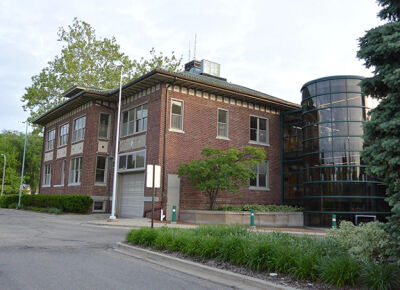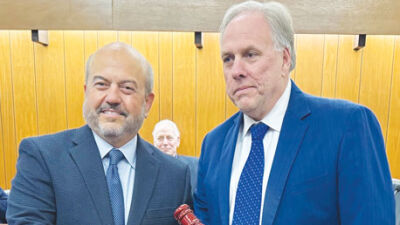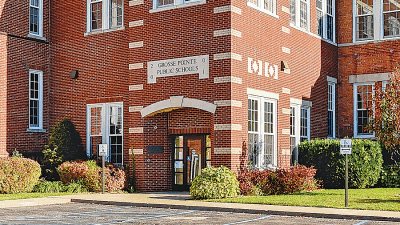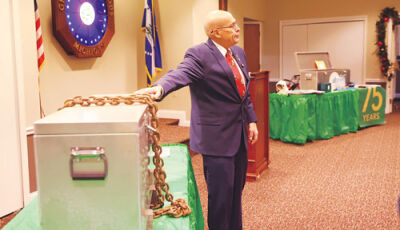GROSSE POINTE PARK — Grosse Pointe Park’s nonprofit Grosse Pointe Park Foundation has made a sizable gift to pave the way for two city purchases.
At a special Grosse Pointe Park City Council meeting Aug. 22, the council voted unanimously in favor of accepting a $160,000 donation from the GPPF. Of that gift, $130,000 will be used to buy the sluice gate and backflow prevention device for the anticipated forthcoming extreme emergency relief valve, or EERV, and $30,000 will be used to acquire ballistic shields for the Public Safety Department.
“This is a special opportunity … to work with our Grosse Pointe Park Foundation,” City Manager Nick Sizeland said. “For the foundation to help with and work on a sewer project is truly amazing. … I just couldn’t be more thankful.”
GPPF Board President Shery Cotton said she’s lived in the Park for about 31 years and has been with the foundation for more than a decade.
“This has been the most we have ever worked together with the City Council,” Cotton said. “We really felt it was important to be a part of the solution. … It is an unusual project (for the foundation), but we feel good about it.”
After catastrophic flooding and sewage backups through the Park in the summer of 2021 wrought havoc on thousands of homes and businesses in the community, the city began looking for solutions in the event of another unprecedented storm. An EERV, which some other communities have, enables communities to discharge sewage into a body of water under specific circumstances, but requires state approval to be implemented. The EERV is one of a number of efforts the city is undertaking to update its sewer system to protect properties and residents.
City Councilman Max Wiener said these purchases were “somewhat out of the foundation’s comfort zone” — past donations have funded amenities, not needs — but praised the foundation for being willing to fund these purchases, which he said “will improve life” for residents.
“We’re extraordinarily lucky to have the philanthropic community that we do,” Wiener said.
City Councilman Martin McMillan echoed that sentiment.
“If you look at the things the foundation has done, it’s just incredible,” McMillan said. “Thank you very, very much.”
Mayor Michele Hodges thanked the foundation for its faith in the community and its generosity, calling its members “mission-minded partners looking to advance this community.”
“We look forward to the next opportunity to work together,” Hodges said.
Hodges said the ballistic shields are “so our law enforcement team will be well equipped to handle any emergency that hopefully never comes our way.”
Public Safety Director Bryan Jarrell said the ballistic shields will protect against different types of gunfire. He said the department has never had these shields before, and the donation will enable the department to purchase seven shields — one for every patrol vehicle. Jarrell said they’re grateful for the gift, but it’s not a piece of equipment they’re eager to use because that would mean officers were responding to a violent emergency.
“I hope they never get used,” Jarrell said.
At press time, he said the department would be ordering the shields but he wasn’t sure when they would arrive.
After the meeting, Cotton said the GPPF’s gift also speaks to the tight budget the city is on.
“They didn’t have the funds to (make these purchases), and we thought it was extremely important to do it,” Cotton said. “We want our community to stay top-notch. … I never want to see that (extreme flooding) again.”
Cotton also praised the council members for “going above and beyond” to find solutions to problems like these.
Sizeland said the sluice gate and backflow prevention device are the parts of the EERV with the longest lead times to order, which is why the foundation agreed to purchase those. He said the gift enables the city to order them now, so that it will have them on hand to start work on the project as soon as possible. Sizeland said it’s expected to take approximately 20 weeks to get those two parts.
“Grosse Pointe Park is very unique, working with generous donors with the foundation,” Sizeland said.
The Park is still working with the state to get a permit for the EERV, he said. Because the permit is for operation of the valve, Sizeland said the city could start building the EERV before the permit is approved — the city just couldn’t use it until the state signs off.
“All of our (work) with the state has gone well so far,” Sizeland said. “We’re progressing really well.”
The entire EERV project is expected to cost about $2 million, Sizeland said. Because of the Park’s proximity to Lake St. Clair, work to construct the EERV is anticipated to take fewer than six months from start to finish, he said. It wasn’t known yet when work would start.
At press time, Sizeland said the city was working on its sanitary sewer model and hydraulic model to present to the state as part of the EERV permitting process.
 Publication select ▼
Publication select ▼




















